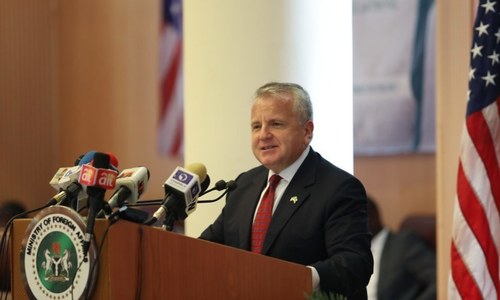Interior Minister Ahsan Iqbal has said that any unilateral action by the United States in Pakistan will not only bring the bilateral relations to an irreparable stage but also be counterproductive.
During an interview to CNN on Tuesday, he said, "Any unilateral action in Pakistan will be a red line for Pakistan. Pakistanis are dignified people. We want to have a friendship which is based on mutual respect but any effort to try to bully Pakistan or force Pakistan will be counterproductive."
The minister highlighted that Pakistan has directly been a victim of terrorism and the country has rendered a lot of sacrifices in the fight against it. "There is no country in the world that has made as many sacrifices and as much contribution towards fighting terrorism [as Pakistan] in the last years."
Pakistan has lost about 60,000 people and suffered a $25 billion loss to its economy, he added.
Talking about the US aid to Pakistan, Iqbal said, "We are committed to fighting terrorism. There is very nominal aid which is coming from the USAID or the United States to Pakistan. Pakistan is not fighting this war for the US aid, we are fighting this war for our people and the future of our people."
He made it clear that "trade and not aid" is the priority of the country when it comes to the bilateral relations with the US. "We need trade, not aid," he remarked, adding that Islamabad wants to see the US as a development partner and not as a donor country.
The Trump administration has asked Congress to approve $336 million of civil and military aid to Pakistan for the next fiscal year, arguing that the proposed military assistance will help defeat Al Qaeda and the militant Islamic State group, Dawn reported on Tuesday.
The total request is $10 million less than the previous year and links the defence assistance to Islamabad’s action against alleged terror safe havens on its soil.
Pak-Afghan-US relations
Talking about Pak-Afghan relations, he said that the two countries are bound by geography. It will be in the interest of both the US and Pakistan to work together because "we [Pakistan] are the first country that faces the cost of instability [in Afghanistan] and we are the first country that gets the dividend of peace in Afghanistan".
"By finger-pointing, we only make the disruptors of peace win," he added.
Editorial: Pakistan and US must talk
Further talking about the status of the US war against terrorism in Afghanistan, the minister said that many people in the US are making Pakistan a scapegoat out of frustration because the desired results in Afghanistan have not been achieved.
The minister suggested a comprehensive approach to have peace in South Asia and also asked the US to address the concerns of all stakeholders in the region. "To have the final outcome in Afghanistan, to have peace and stability, we need to follow a comprehensive approach. We need to have a military option as well as a political option. Both Afghanistan and Pakistan's legitimate security concerns and interests must be incorporated in the approach that we follow in the region," he said.
Talking about the erratic relations between the two countries and mutual interests, he said he saw the geopolitics of the region as a centre point. He added that no global power can afford to overlook the fault lines that exist in the region. "In past, the US and Pakistan have tried to file for a divorce on a number of occasions but that has not turned out to be an option because of the cost associated with it," he said.
"Afghanistan is critical to both the US and Pakistan. The geography of Afghanistan and Pakistan bound them and therefore, we need to have a collaborative strategy instead of one which is based on finger-pointing," the minister said.
When asked about India's role in this scenario, Iqbal said that the US needs to see South Asia or Afghanistan from its own independent perspective, not through the prism of India. "Pakistan and the US have a long history of partnership and relationship, [whereas] a third country can spoil the scenario in the region."















































